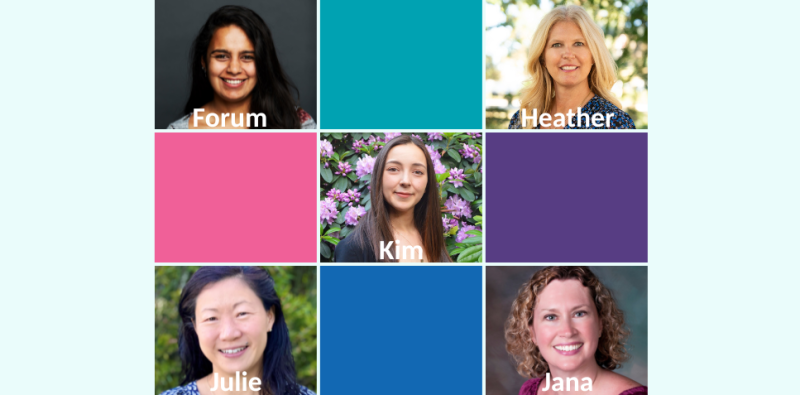PUBLISHED: 10th November 2022

The topic of hereditary cancer is complicated and often confusing. FORCE is grateful for the counseling, understanding of test results and guidance that genetic counselors (GCs) share with patients to aid in medical decision-making. In honor of Genetic Counselor Day (the second Thursday in November), we checked in with a few GCs to learn about their experiences.
Heather Hampel, MS, CGC, City of Hope National Medical Center
Heather was in her second year of graduate school when she realized she could combine her lifelong love of genetics and Punnett squares with her desire to work in oncology and the field of cancer genetics. Early on, Heather reached out to FORCE so she could better understand her patients, and her connection hasn’t stopped since. Her work on universal tumor screening for Lynch syndrome has helped many. Heather also supports FORCE as a member of the scientific advisory board.
Jana Pruski-Clark, MPH, MS, CGC, InformedDNA
Jana’s goal is to remove as many barriers as possible for individuals who want genetic testing. As part of the clinical team at InformedDNA, Jana provides telehealth genetic counseling so people can have their appointment from home. She also provides evening and weekend appointments.
Forum Shah, MS, CGC, Bellevue Hospital & NYU Langone Health
By working in a “safety net” public hospital, Forum has been able to bring awareness about hereditary cancer syndromes and risk management to minority communities that are unaware of these services. She hopes this work will help save many individuals in high-risk families from advanced cancer diagnoses. As a FORCE support group leader, Forum finds it rewarding to guide members as they discuss their fears and concerns and help them realize that all they feel is justified. She enjoys watching people connect with one another and find a safe place where they are understood.
Julie Mak, Genetic Counselor Supervisor, UCSF Hereditary Cancer Clinic
When Julie was in graduate school (NOT studying genetic counseling) and feeling burnt out on lab research, she started volunteering at a local non-profit supporting people with breast cancer. She quickly realized that her fluency in researching and interpreting medical literature could be used to help patients. Today she works in a specialized group within the UCSF Cancer Genetics and Prevention Program that includes genetic counselors, nurse practitioners and specialist physicians who focus on care for people with inherited risk for breast, ovarian and other cancers. Julie has presented to medical providers in nongenetics fields to raise awareness about hereditary cancer and genetic testing. She is a member of the National Comprehensive Cancer Network (NCCN) panel for hereditary breast, ovarian and pancreatic cancer, where she brings advocacy and what she’s learned from individuals to help shape policy.
Kim Zayhowski, MS, CGC, Boston Medical Center and Boston University Chobanian & Avedisian School of Medicine
As a queer genetic counselor, Kim has dedicated herself to bettering cancer care systems for the LGBTQIA+ community. Through research and education, she is committed to elevating the needs of transgender, nonbinary and gender-diverse people in cancer clinics, as these needs often intersect with gender-affirming care. Taking part in a panel during the recent FORCE conference, Kim says she felt humbled to have contributed to FORCE’s conference and to equip gender-diverse folks with information and self-advocacy tools in considering cancer screening and care.
It's All About Helping Patients
All of these genetic counselors had a common reminder to share—the goals of genetic counseling are to provide patients with the information and resources they need to make decisions about their health and to understand the potential impact on their families. Julie says, “Sometimes, genetic counseling can be like getting a prescription for new glasses; you don't realize what you’re missing. Then you can see more clearly, and hopefully, you can let a little of the stress out of your body and feel freer to live all the other parts of your life.”
FORCE Says Thank You
On behalf of FORCE, we thank all of the genetic counselors that guide so many patients who have or are at risk for hereditary cancer. We are grateful for all that you do to help so many!